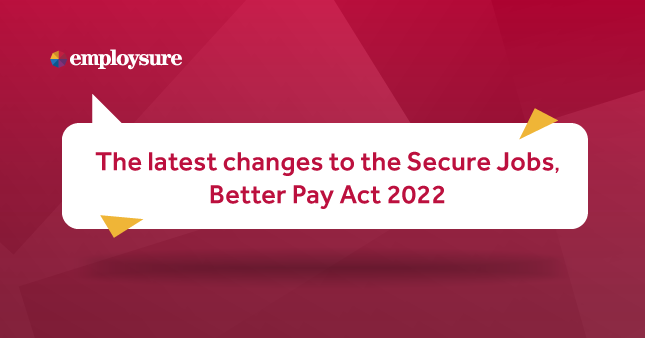
The Secure Jobs, Better Pay Bill represents the largest employment law reform since the Fair Work Act was first introduced in 2009. With extensive changes, this guide breaks down the Fair Work Act amendments and offers general information for employers.
Secure Jobs, Better Pay Bill Summary
The Fair Work Act aims to introduce a national workplace relations system that sets minimum standards and conditions for employees, while also providing the legal framework for employer-employee relations for most workplaces in Australia.
14 years have passed since the Fair Work Act was introduced and the Secure Jobs, Better Pay Bill is intended to modernise employment law in line with the nation’s most pressing workplace issues. These include creating more secure jobs and further closing the gender pay gap.
What is changing?
The Secure Work, Better Pay Bill is part of a comprehensive package of reforms the Australian Labour Party proposed in the lead-up to the election in May 2022.
Beneath is a breakdown of the biggest legislative amendments and a timeline clarifying the dates when new legislation comes into effect.
Gender equality
✔ The object of the Act has been adjusted to include gender equality and job security.
✔ Gender equality and job security are now given the same weighting as other objectives, such as productivity and economic growth, throughout the workplace relations framework.
✔ Gender equality and job security will be considered by the Commision when varying modern awards.
✔ Gender equality will be an objective when minimum wages for different awards are set during the Annual Wage Review, helping to eliminate gender pay gaps.
These changes came into effect on the 7th of December 2022.
Suggested next steps for employers
With the amendments intended to close the gender pay gap, review your pay rates and decide if any changes are required to ensure gender equity. This is also a suitable time to consider how your organisation is promoting gender equality more broadly.
Discrimination
✔ The Act has been amended to include gender identity, intersex status, and breastfeeding in its list of protected attributes, which already include:
Race
Colour
Sex
Sexual orientation
Age
Physical or mental disability
Marital status
Family or carer’s responsibilities
Pregnancy
Religion
Political opinion
National extraction or social origin
✔ All these protected attributes are included in provisions for discriminatory terms in agreements, awards, and general protections.
These changes came into effect on the 7th of December 2022.
Suggested next steps for employers
Ensure the way you treat all your employees and job applicants is based on individual merit, without any discrimination stemming from these protected attributes. You should also have measures in place to prevent employees from harassing others in relation to protected attributes.
Prohibiting pay secrecy clauses
✔ Amendments to the Act prohibit pay secrecy clauses and provide employees with a right to disclose or not disclose their remuneration.
✔ This amendment applies to all new or revised employment contracts and written agreements from the 7th of December 2022.
This change came into effect on the 7th of December 2022.
Suggested next steps for employers
You should redraft your employment contract templates and remove pay secrecy provisions. It is also wise to consider how pay transparency might impact relationships between staff and company morale.

Employee contracts & legislation – Are you up to scratch?
Every business needs to remain compliant with employee contracts and handbooks. Our Employment Contracts and Legislation e-guide outlines your responsibilities as an employer and gives practical advice on setting up new employees the right way.
Sexual harassment
✔ The amendment protects workers, prospective workers, and employers from sexual harassment.
✔ With the agreement of both parties, the Commision can now perform a resolution process and make orders for unresolved sexual harassment disputes, including compensation.
These changes came into effect on the 6th of March 2023.
Suggested next steps for employers
With increased employer obligations to prevent and respond to sexual harassment in the workplace, you should evaluate whether your business is equipped to manage sexual harassment risks and ensure effective controls in place.
Right to request flexible work arrangements
✔ The Act has been amended to strengthen the right for eligible employees to request flexible working arrangements.
✔ There is no change to the reasonable business grounds on which a request for flexible work can be refused by an employer.
✔ Because small employers may not have the same capacity as larger businesses to facilitate a flexible working arrangement, the new legislation clarifies that the size and nature of the business are relevant when considering whether the employer has reasonable grounds for refusing a request.
✔ Employees now receive increased access to dispute resolution through the Commission if they cannot resolve flexible working arrangement disputes with their employer.
These changes come into effect on the 6th of June 2023.
Suggested next steps for employers
You should review your existing processes for responding to flexible work requests and ensure your business complies with the revised requirements.
Unpaid parental leave
✔ The National Employment Standards have been adjusted to provide eligible employees with an entitlement to unpaid parental leave. An employee taking 12 months unpaid parental leave can request an extension of a further 12 months leave (unless their partner has already taken 12 months of leave).
✔ Unresolved disputes about extension requests can now be processed by the Commision if an agreement cannot be reached.
These changes come into effect on the 6th of June 2023.
Suggested next steps for employers
You should review your existing processes for responding to unpaid parental leave extensions to ensure you comply with the revised requirements.
Enterprise agreements and enterprise bargaining
Enterprise agreements lay out employment conditions, including pay rates and leave entitlements, for up to 4 years from the date of approval.
There are two main types of enterprise agreements:
Single interest enterprise agreements refer to agreements that have two or more employers who engage in a joint venture or common enterprise.
A multi-enterprise agreement is like the former, but covers employers in an industry, rather than employers in a joint venture or common enterprise.
Enterprise bargaining is a process of negotiation between the employer and employees (or the enterprise bargaining representatives of employees), with the aim of making an enterprise agreement. The Fair Work Act lays out the requirements for enterprise agreement bargaining.
✔ Amendments to the Act have introduced changes to the supported bargaining stream, including how enterprise bargaining processes may be started.
✔ If an employer refuses to bargain the terms of an enterprise agreement, employees can push their employer to engage in good faith enterprise bargaining by applying to the Commission for bargaining orders.
✔ Amendments permit an employee or employee organisation to apply to the Commission for a variation to an existing single-enterprise agreement. The Commission is required to issue a variation if certain conditions are met.
✔ The Commission now has the powers to correct errors in enterprise agreements, performing any corrections they see fit. Employers, employees, and unions covered by an agreement can also apply to the Commision for corrections.
These changes come into effect on the 6th of June 2023.
Suggested next steps for employers
Revisions to the enterprise bargaining framework will significantly shift bargaining power away from employers, with employees now more likely to apply to the Commision for enterprise bargaining outcomes and variations. Ahead of any future enterprise bargaining rounds, be sure to revise your bargaining strategy.
Small claims procedures
✔ The Act has been amended to assist workers in recovering their unpaid work entitlements via small claims court procedures.
✔ The cap on the amount that can be awarded through small claims court proceedings has been raised from $20,000 to $100,000. This makes the small claims procedure available to more workers.
These changes come into effect on 1st of July 2023.
Suggested next steps for employers
Check all your documentation, policies, and contracts to make sure you are properly remunerating any paid work.
Limiting the use of fixed term contracts
✔ Amendments to the Act limit the use of fixed term contracts for the same role beyond two years (including renewals) or two consecutive contracts – whichever is shorter.
✔ Where a fixed term contract is made in breach of the new laws, the employee will be considered a permanent employee.
✔ The employee will retain the terms and conditions of their fixed term contract, while gaining access to relevant safety net provisions including:
Entitlements to notice of termination and redundancy payments.
Access to unfair dismissal proceedings.
✔ Employers who breach the contract limitations or do not provide a Fixed Term Information Statement may be subject to civil penalties.
These changes came into effect on the 6th of December 2023.
Suggested next steps for employers
The secure Australian jobs plan will see increased restrictions on fixed term contracts. In response, you should review both your current employee contracts and how you contract new employees.
Key dates for Secure Jobs, Better Pay Bill
| Date | Changes |
| 7th of December 2022 | ✔ Gender equality and job security added as objectives to the Fair Work Act. ✔ Pay secrecy provisions removed. ✔ New protected attributes added for breastfeeding, gender identity, and intersex status. ✔ The Fair Work Commision has powers to correct enterprise agreements and intervene in enterprise bargaining processes. |
| 7th of January 2023 | ✔ Job advertisements banned from including pay rates that breach the Fair Work Act, Awards, and enterprise agreements. |
| 6th of March 2023 | ✔ The Fair Work Commision can intervene in unresolved sexual harassment disputes. |
| 6th of June 2023 | ✔ Changes to requests for extended parental leave, offering increased employee access. |
| 1st of July 2023 | ✔ Increase in monetary cap for unpaid wages claims. |
| 6th of December 2023 | ✔ Limitations on fixed term contracts. |
Do the Fair Work Act amendments raise any concerns in your company? If you own an Australian business and have issues surrounding workplace relations or health and safety, call our free 24/7 Advice Line on 1300 651 415 to speak with an Employsure expert.


